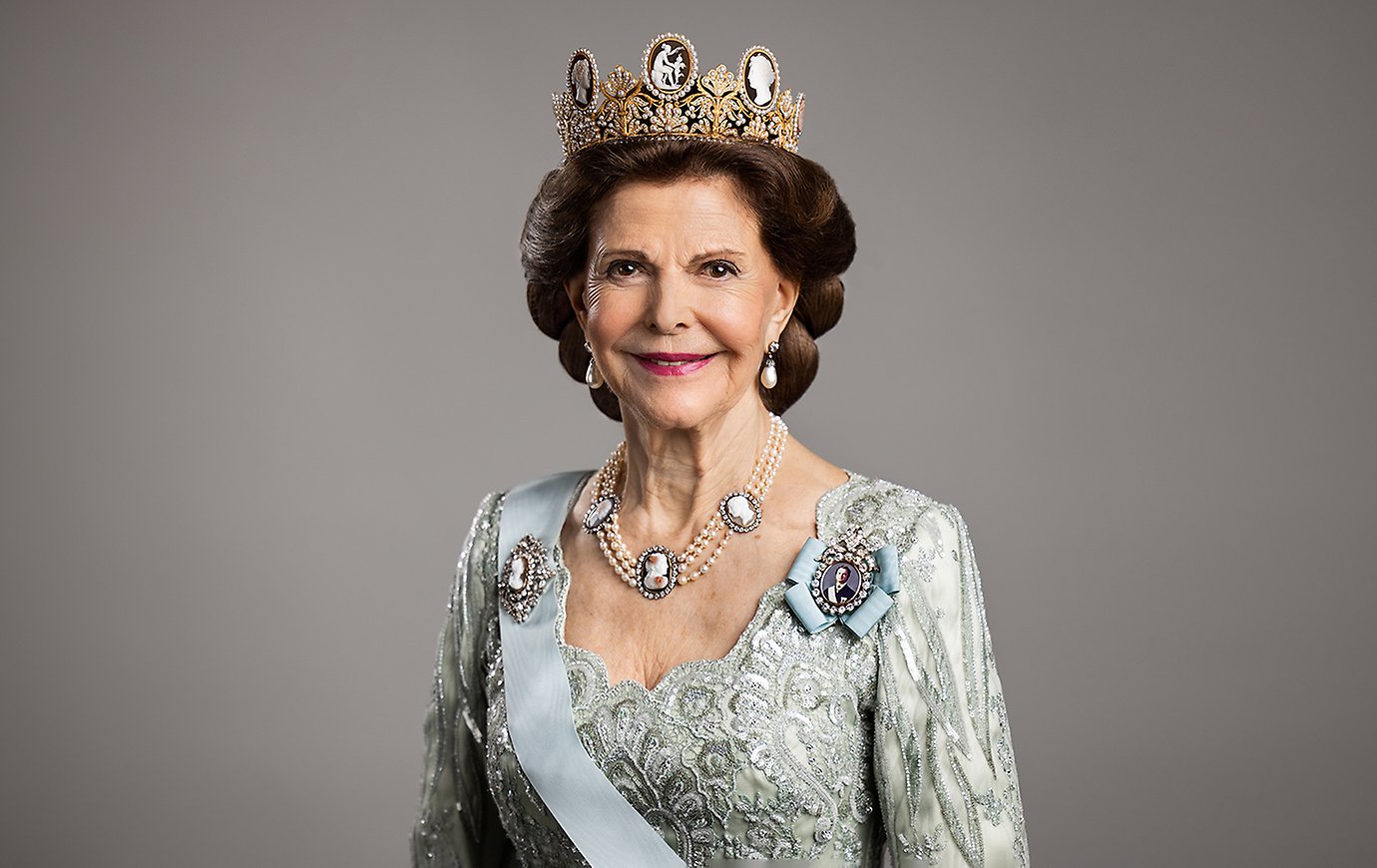HM The Queen
SILVIA Renate, Queen of Sweden, born on 23 December 1943. Married on 19 June 1976 to HM King Carl XVI Gustaf.
Official duties
HM The Queen's official duties
HM The Queen and other members of the Royal Family assist HM The King in his duties as Sweden's Head of State. Her Majesty often accompanies The King on various travels and visits within Sweden, as well as on state visits and official visits abroad.
The Queen regularly visits a range of different operations within the public, private and voluntary sectors. She opens and takes part in conferences, symposiums and official events, often in connection with her personal commitment to social issues.
The Queen is patron of many organisations, and is also an honorary board member and honorary member of a number of organisations and associations. Over the years, The Queen has received a number of awards and recognitions for her involvement in social and humanitarian issues, and she holds several honorary doctorates.
The Queen is a member of the Church of Sweden.
As well as Swedish, Her Majesty speaks German, English, French, Spanish and Portuguese. The Queen has also studied sign language.
Biography
HM The Queen's biography
HM The Queen was born in Heidelberg, Germany, on 23 December 1943. She is the daughter of the late Director Walther Sommerlath and his late Brazilian wife Alice Sommerlath, née Soares de Toledo.
- The Queen has an older brother, Ralf Sommerlath. Her brothers Jörg and Walther died in 2006 and 2020 respectively.
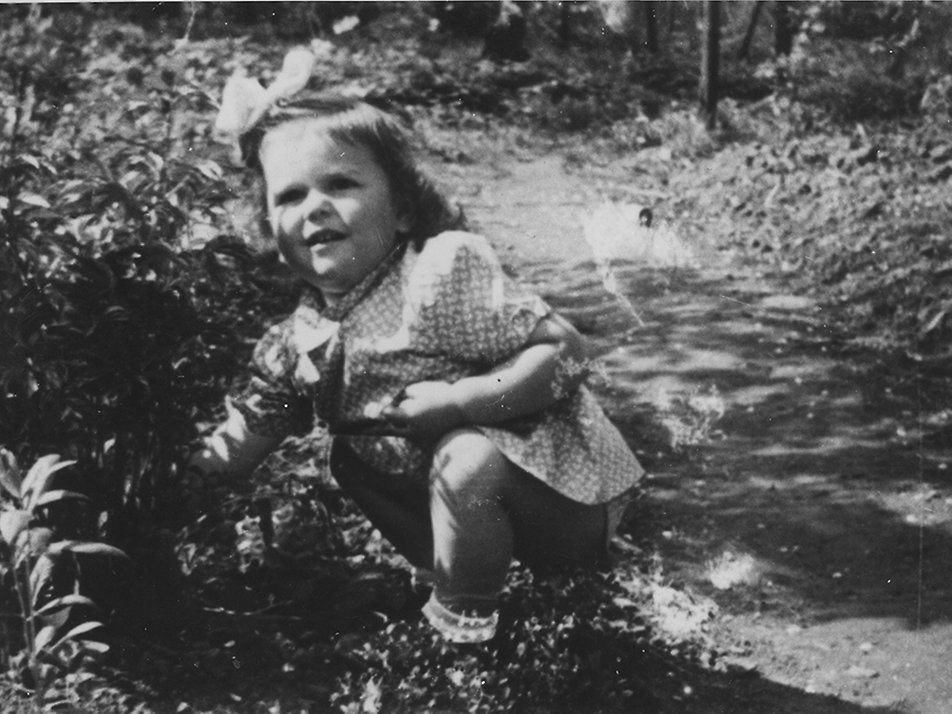
The Queen as a child. Photo: The Bernadotte Library's image archive
Childhood
Silvia Renate Sommerlath and her family lived in Heidelberg until 1947, when they moved to São Paulo, Brazil, where her father built up Svenska Uddeholm's Brazilian subsidiary and was Managing Director. In 1957, the family returned to Düsseldorf, Germany, where her father managed Uddeholm AB until 1967.
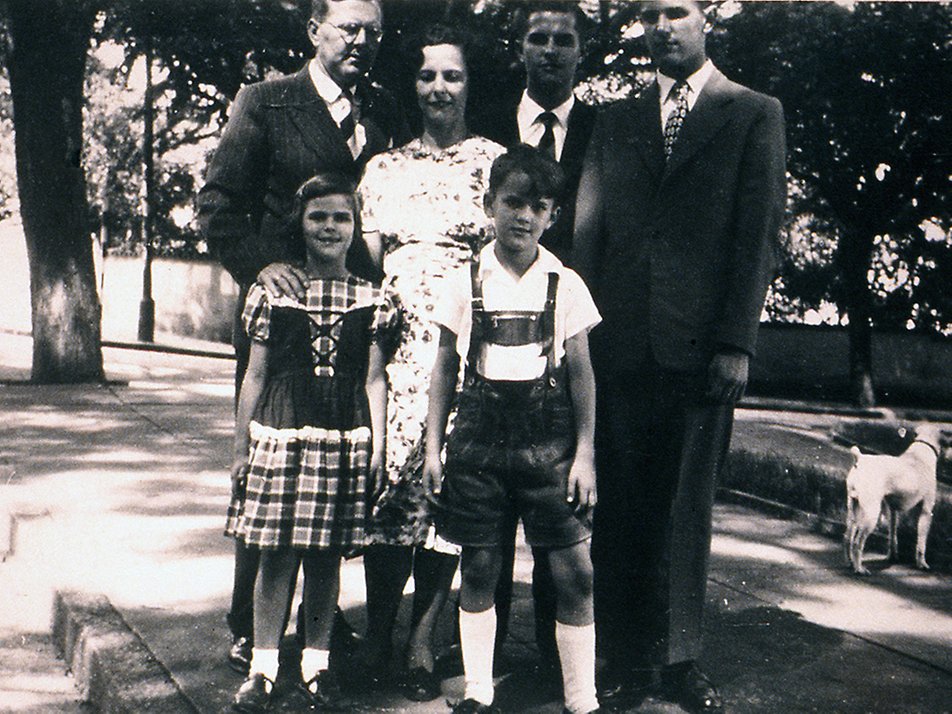
The Queen with her parents and bothers. Photo: The Bernadotte Library's image archive
Studies and career
In 1963, Miss Sommerlath graduated from the Luisenschule school in Düsseldorf. From 1965 to 1969, she studied as an interpreter at the Munich Institute of Language and Interpretation, qualifying in Spanish. She then worked at the Argentinian consulate in Munich.
From 1971 to 1973, Silvia Sommerlath worked as a training manager for Olympic hostesses at the 1972 Munich Olympic Games, and in 1973 she became Head of Protocol for the Organising Committee for the 1976 Olympic Games in Innsbruck, Austria.
It was during the 1972 Munich Olympic Games that Silvia Sommerlath met the then Crown Prince of Sweden.
It was during the 1972 Munich Olympic Games that Silvia Sommerlath met the then Crown Prince of Sweden.
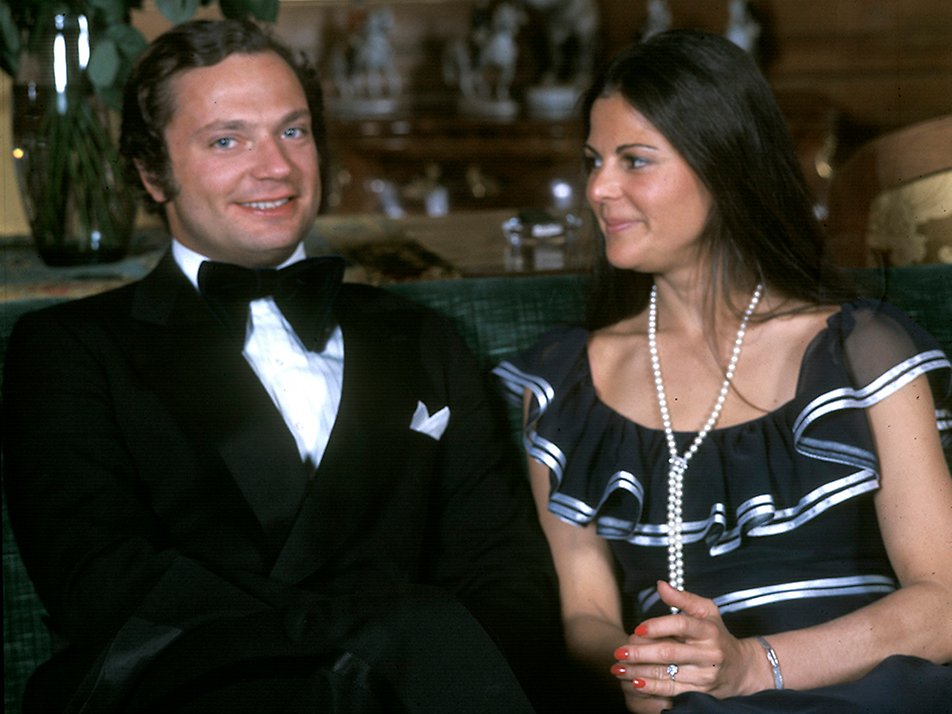
Engagement banquet for HM The King and Miss Silvia Sommerlath. Photo: The Bernadotte Library's image archive
Engagement, wedding and family
The engagement between HM The King and Miss Silvia Sommerlath was announced on 12 March 1976. The wedding took place on 19 June that year at Stockholm Cathedral. The officiating clergy were Archbishop Olof Sundby, Chief Court Chaplain Hans Åkerhielm and Professor of Theology Dr Ernst Sommerlath.
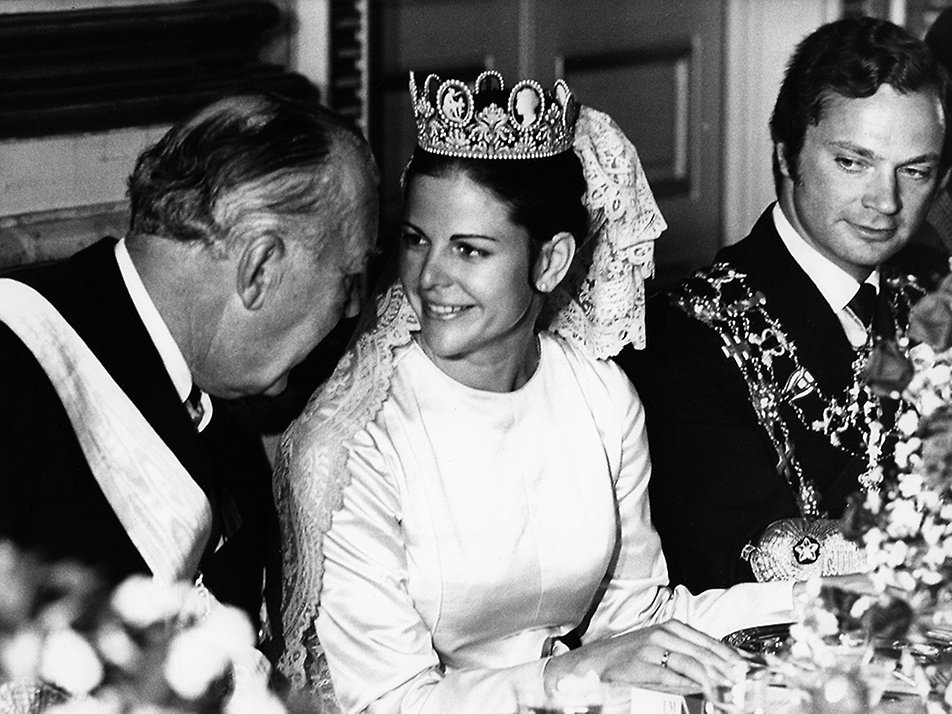
The Queen speaks with Prince Bertil during the wedding lunch. Photo: The Bernadotte Library's image archive
The King and Queen have three children: Crown Princess Victoria, born in 1977, Prince Carl Philip, born in 1979, and Princess Madeleine, born in 1982.
For the first few years, the Royal Family lived in an apartment at the Royal Palace in Stockholm. In 1982, The King and Queen and their children moved to Drottningholm Palace. Since moving there, the Royal Family have continued to use the Royal Palace as their place of work.
Interests and commitments
HM The Queen's personal interests and commitments
Her Majesty The Queen has long had a deep interest in humanitarian issues. In particular, The Queen has chosen to focus on children's vulnerability and caring for people with dementia.
The World Childhood Foundation
In spring 1999, The Queen took the initiative to establish the World Childhood Foundation. The Queen is Honorary Chair of the Foundation, which aims to improve conditions for vulnerable children and children who are exposed to violence or sexual attacks. Over the years, the Foundation has supported more than 1,200 projects in 19 different countries. Childhood now has a presence in Sweden, Brazil, Germany and the USA.
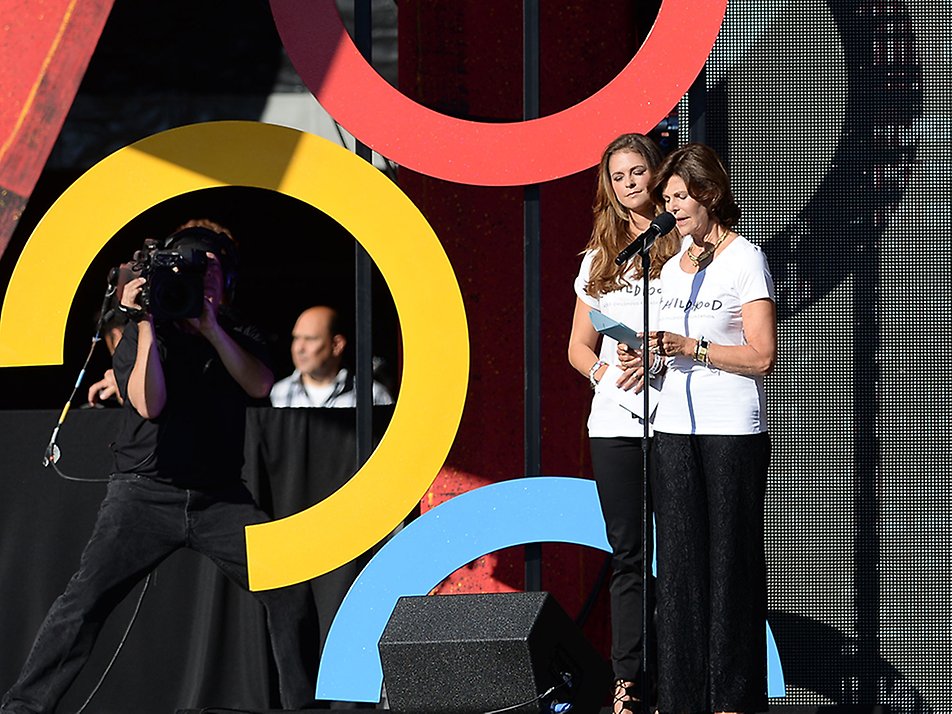
The Queen and Princess Madeleine in New York during a World Childhood Foundation visit. The Queen gave a speech at a concert in Central Park. Photo: Anthony Behar/Sipa USA
Mentor
In 1994, The Queen founded the Mentor Foundation, now known as Mentor International, which strives to give young people a sense of self-esteem and the power to grow through mentoring. Its vision is a world where young people are empowered to make healthy decisions and live drug-free.
More than 100,000 young people in Sweden have taken part in Mentor's programmes. As well as Sweden, Mentor also has a presence in Germany, Latvia and the USA. Mentor Arabia is the regional coordinator for operations in 22 Arab nations.
The Queen is President of Mentor International and an honorary board member of Mentor Sweden.
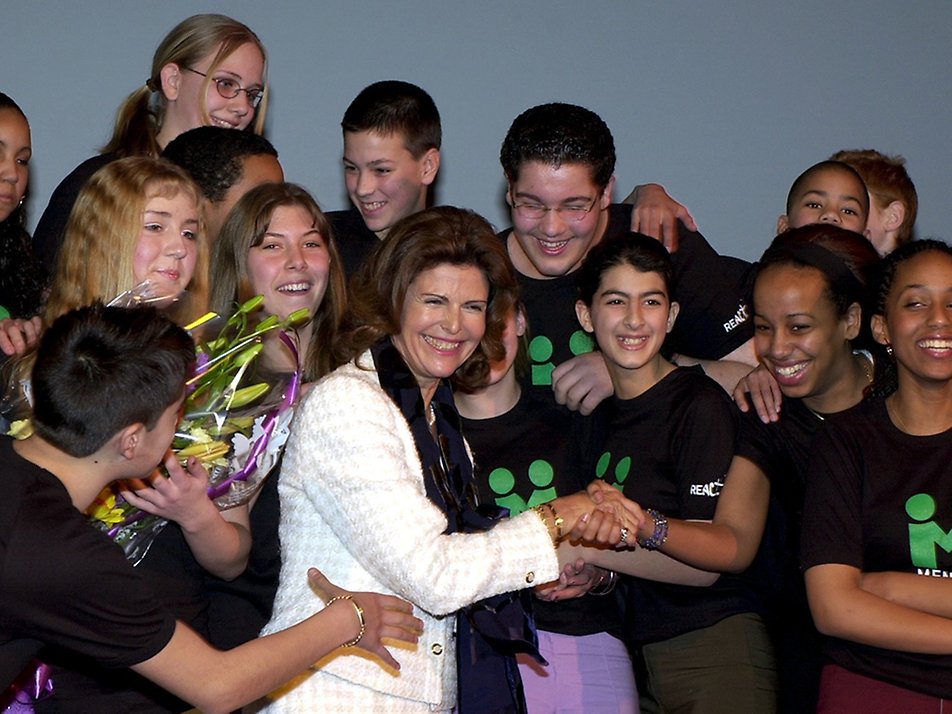
The Queen during a visit with Mentor to Kristina School in Angered in 2000. Photo: Anders Wiklund/TT
The Global Child Forum
In 2009, The King and Queen initiated the World Child & Youth Forum, now known as the Global Child Forum. The forum works within industry to raise awareness of children's rights, and to help businesses integrate these perspectives into their operations using effective tools.
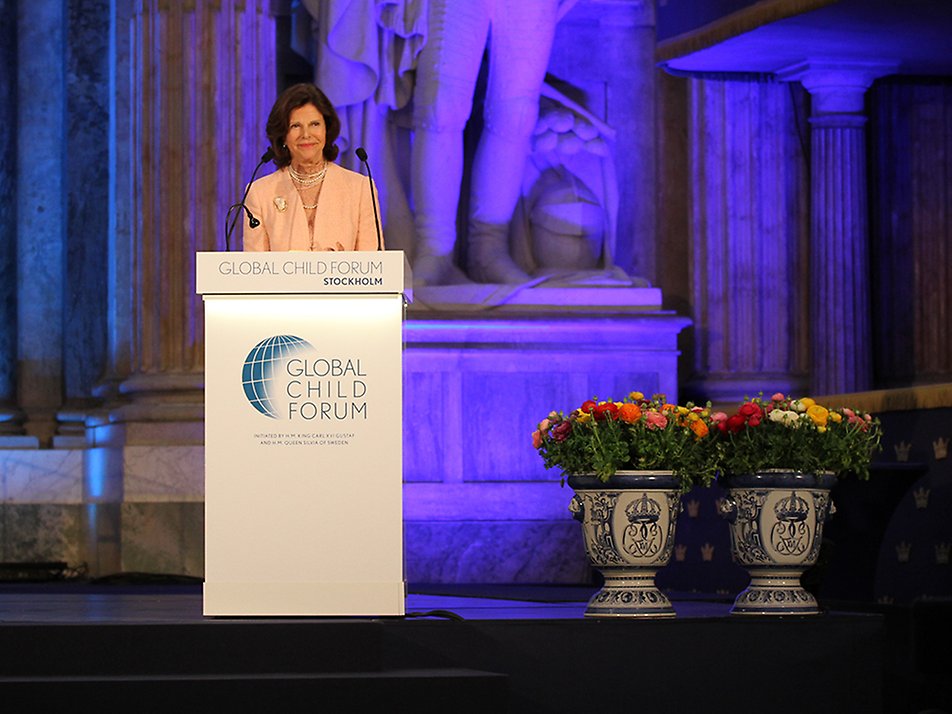
The Queen gives a speech at the 2014 Global Child Forum. Photo: Henrik Garlöv/The Royal Court of Sweden
Queen Silvia's Foundation – Care About the Children
Queen Silvia's Foundation – Care About the Children was established in 2013 to mark The Queen's 70th birthday. The foundation supports vulnerable children in Sweden and around the world by assisting established aid agencies with clearly defined projects.
The Silviahemmet Foundation
The Silviahemmet Foundation was established at The Queen's initiative in 1996. The Queen chairs the foundation's board. The Silviahemmet Foundation promotes research and education, and works with Sophiahemmet University College and Karolinska Institutet to train assistance officers, assistant nurses, nurses, occupational therapists, physiotherapists and dementia doctors. The foundation also certifies entire care units in dementia care.
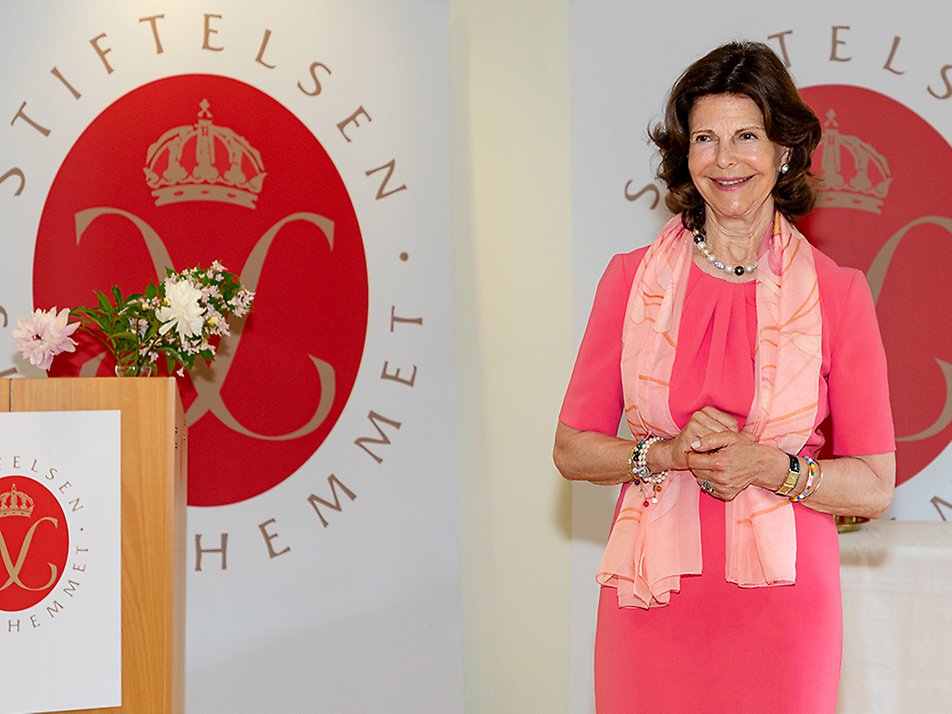
The Queen during a visit to Silviahemmet on Ekerö. Photo: Yanan Li
Funds for research
The Queen chairs the Royal Wedding Fund, which supports research into sport and physical activities for young disabled people.
She also chairs Queen Silvia's Jubilee Fund. The fund was established in 1993, and supports research into children's disabilities.
Queen Silvia's Foundation for Research and Training was created in 1993 to promote scientific research, particularly within dementia. The Queen chairs the foundation's board.
Personal interests
With a growing number of grandchildren, The Queen likes to spend time as much time as possible with her family.
The Queen also enjoys flowers and gardening. The Royal Family spends much of the summer at their summer palace Solliden on Öland, where The King and Queen are involved in the long-term preservation of the beautiful grounds.
The Queen is interested in performing arts, and enjoys attending the theatre, the opera and concerts.
Her Majesty has a keen interest in history, and enjoys reading during her spare time.
The Queen also shares The King's interest in nature and outdoor activities. The King and Queen enjoy skiing during their annual visits to their cottage in Storlien, Jämtland.
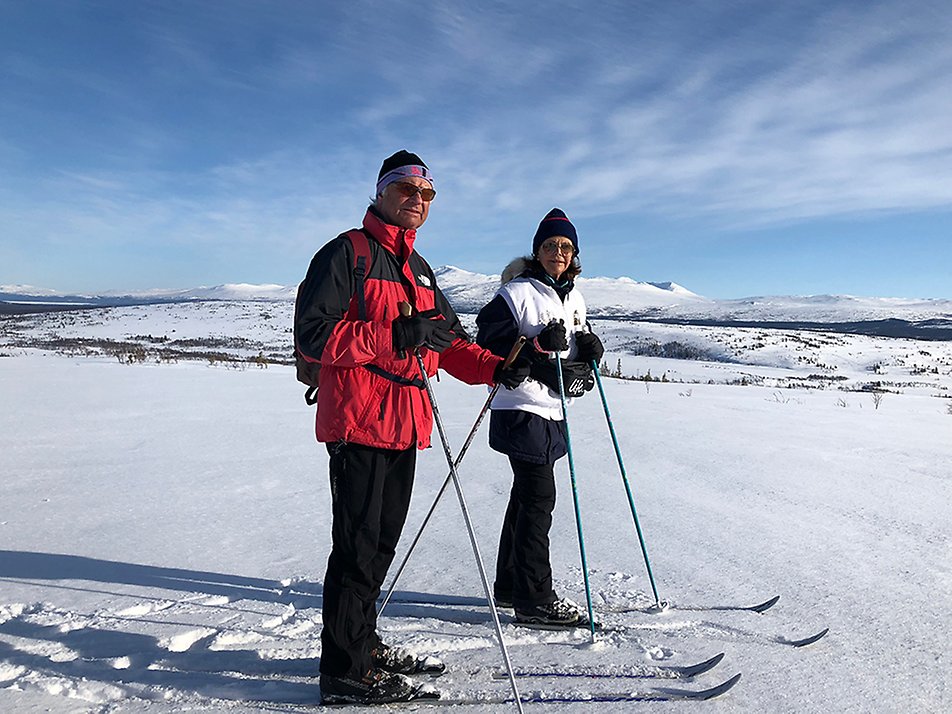
The King and Queen skiing in Storlien, Easter 2018. Photo: The Royal Court of Sweden
Official portraits
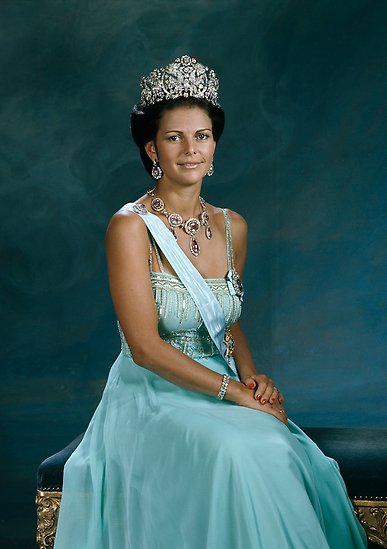
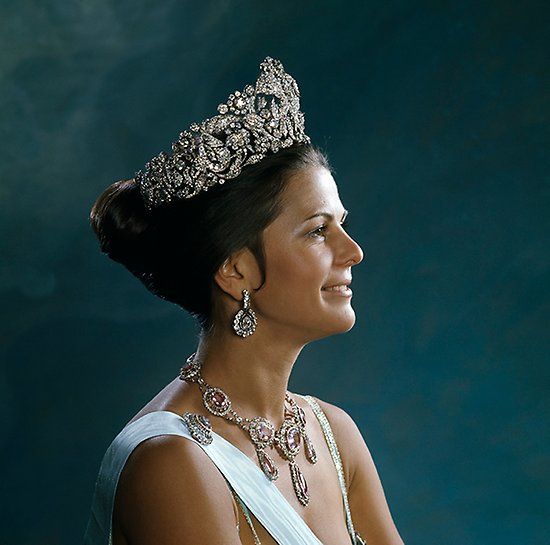
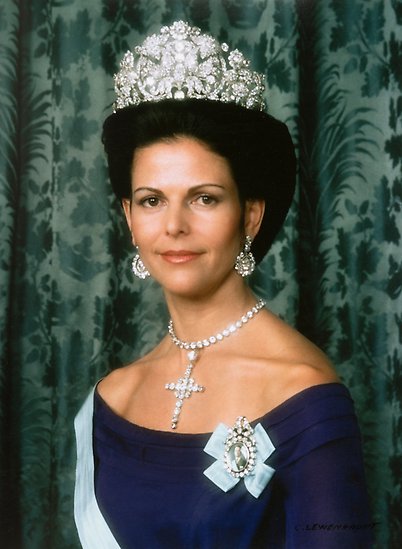
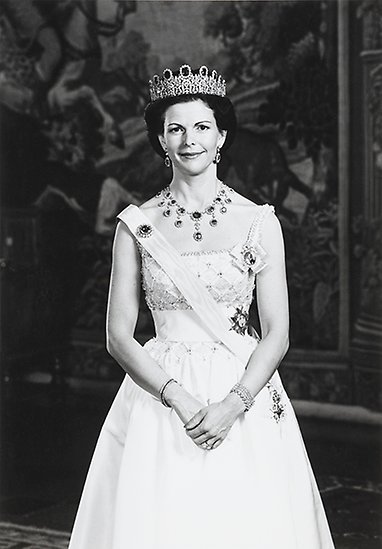
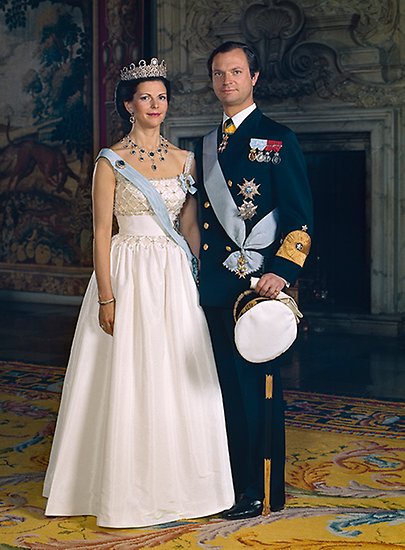
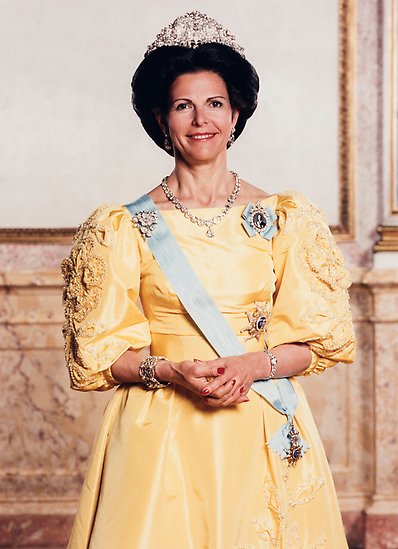
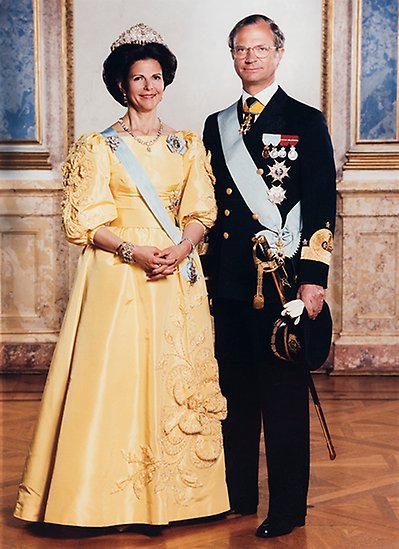
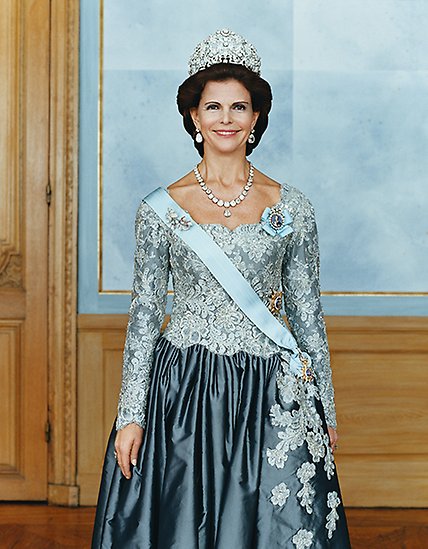
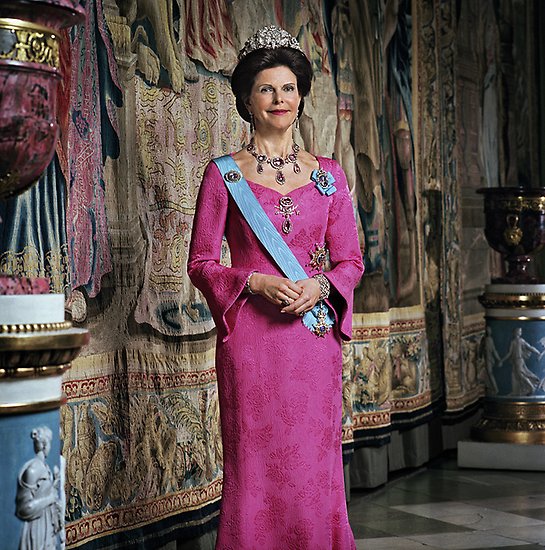
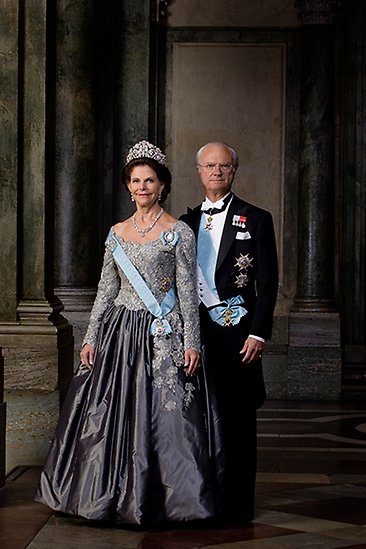
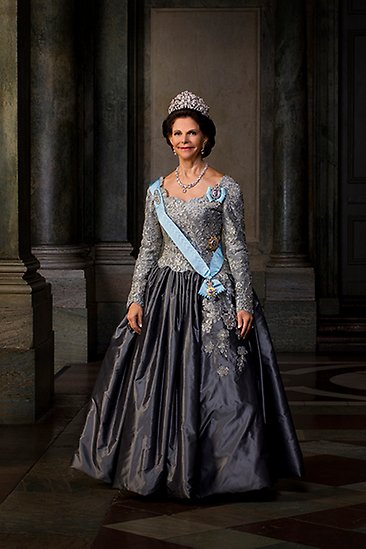
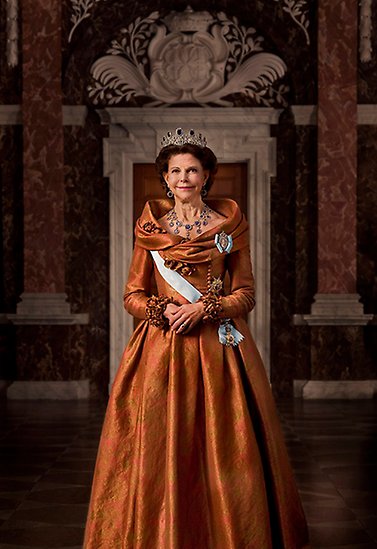
.jpg)
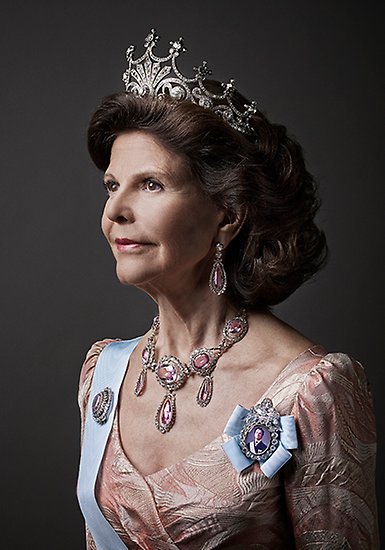
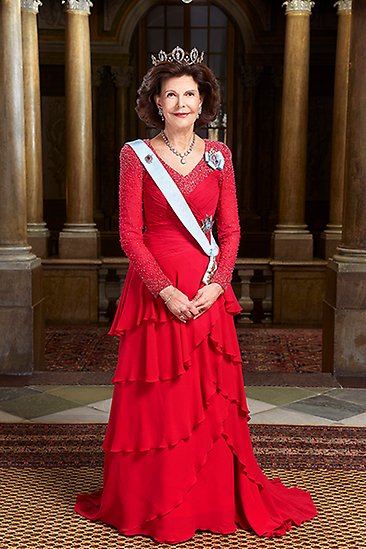
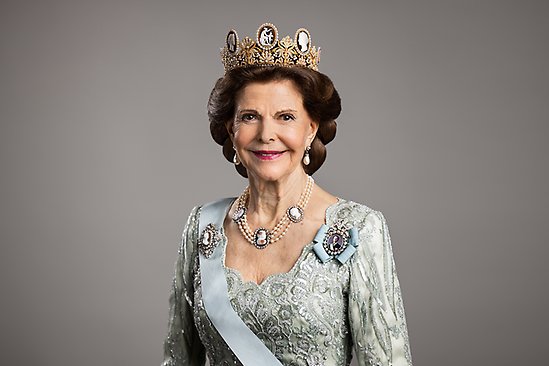
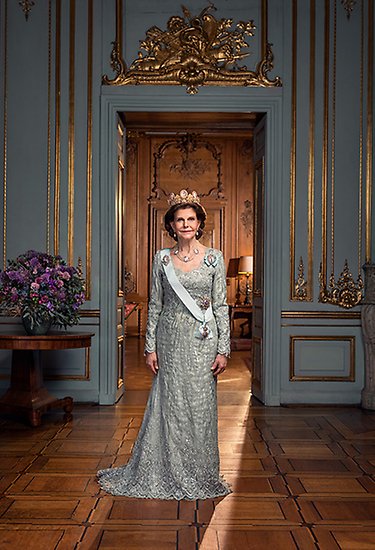
The Queen through the years
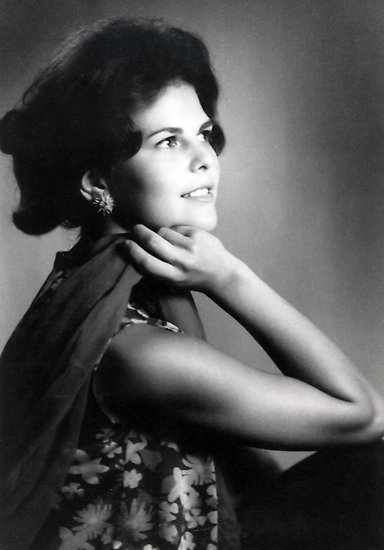
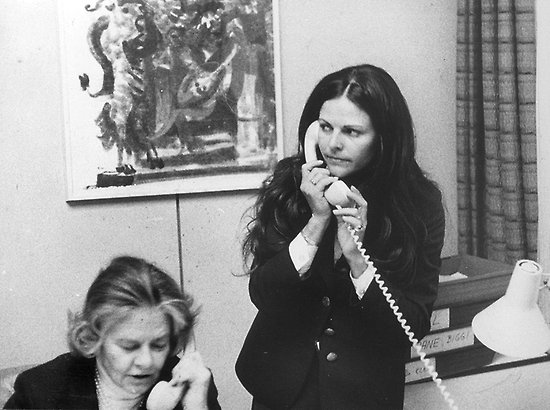
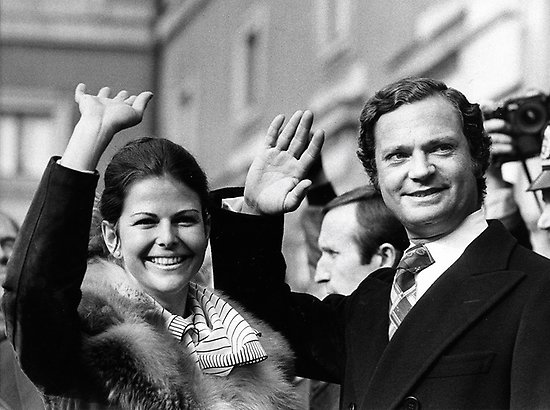
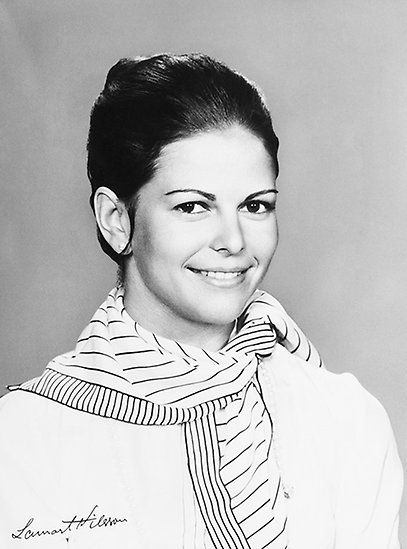
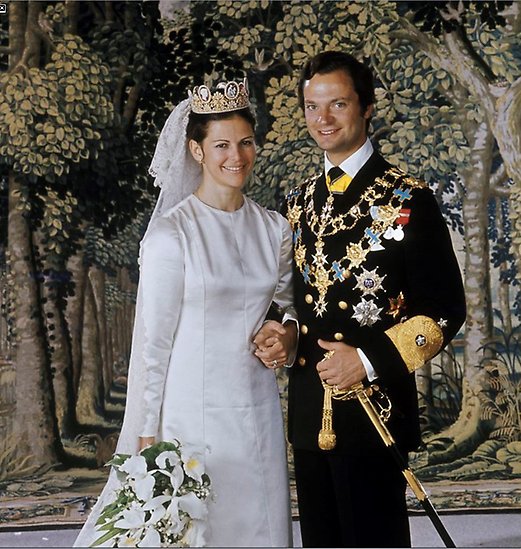
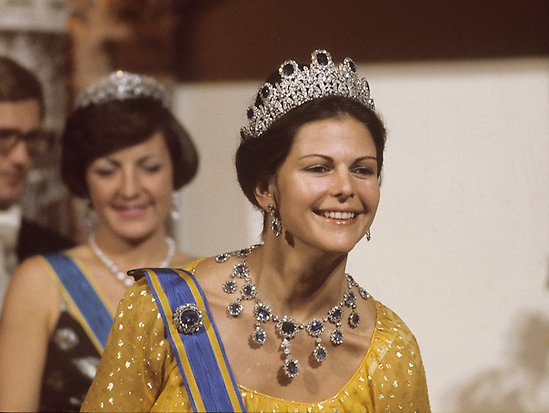
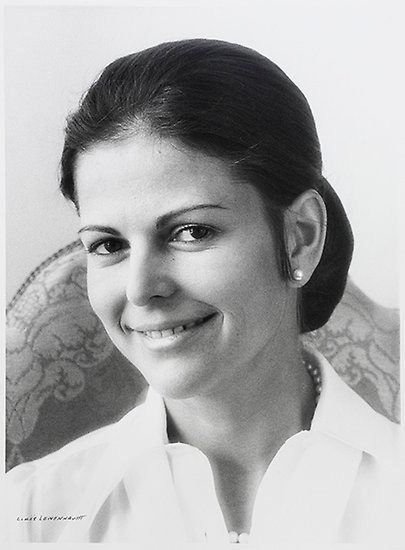
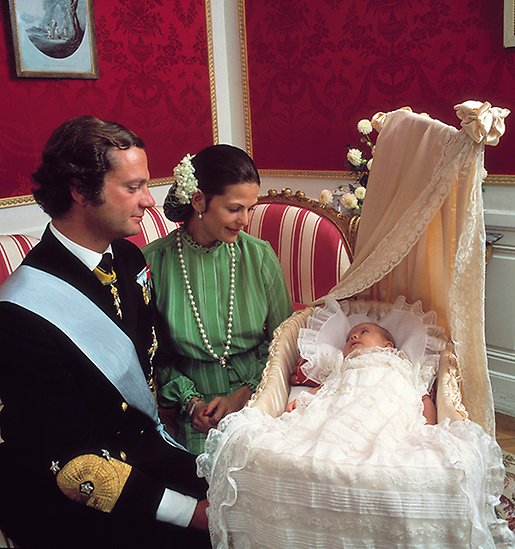
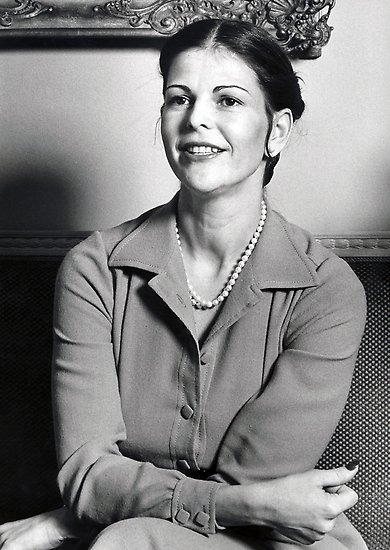
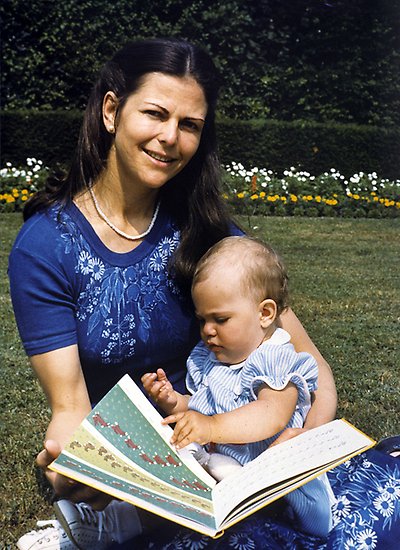
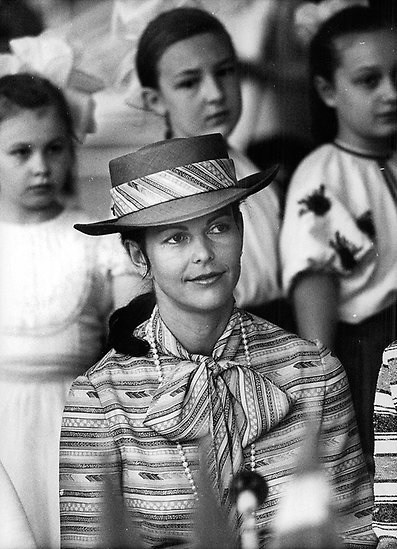
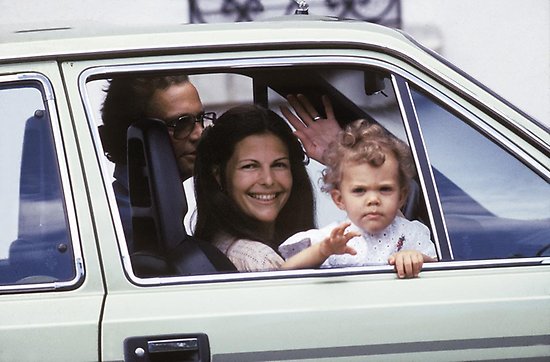
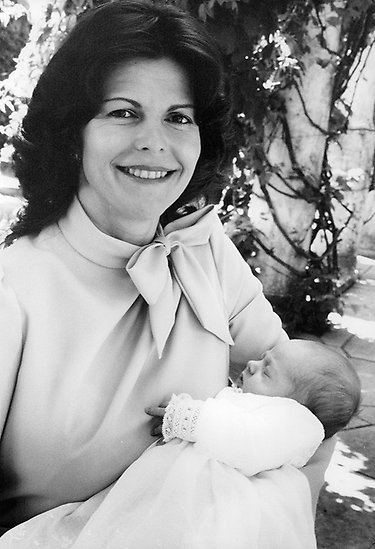
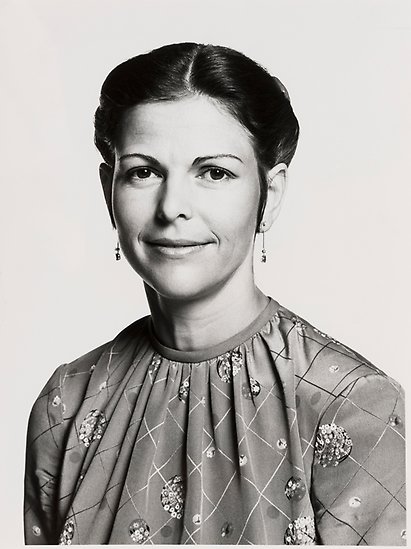
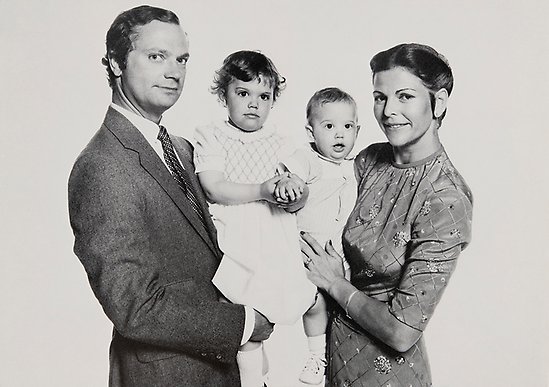
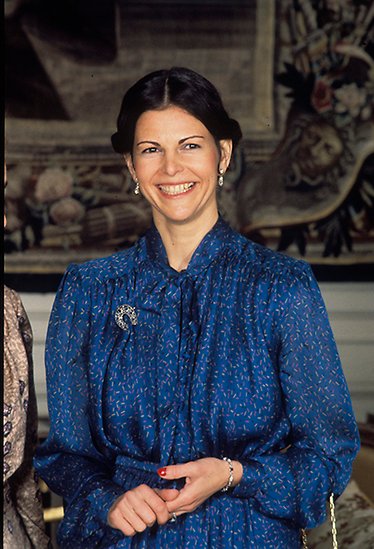
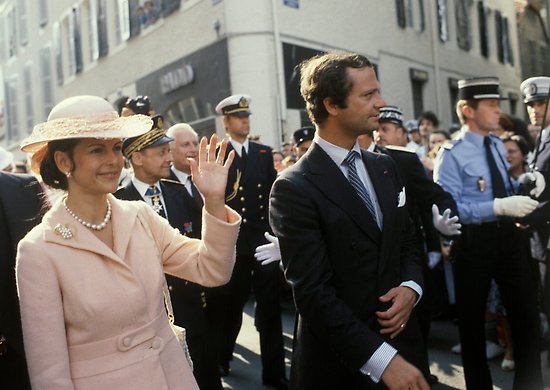
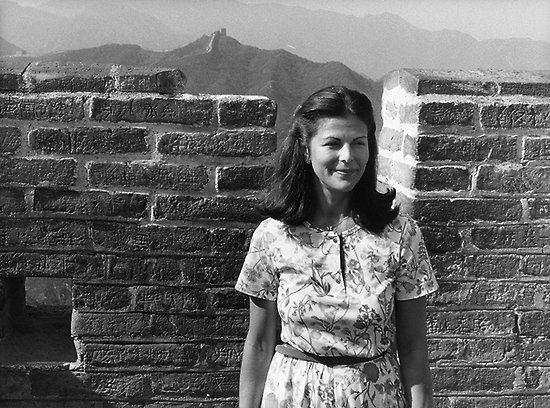
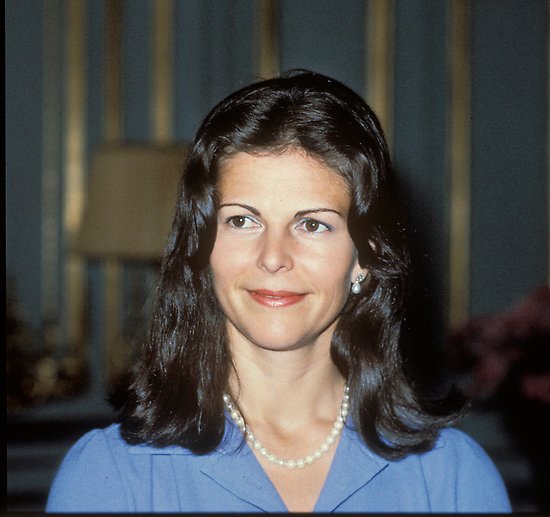
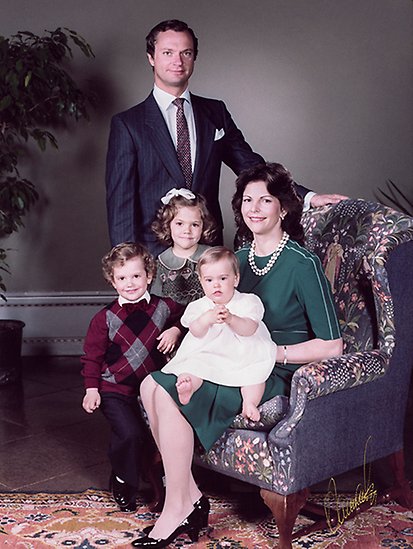
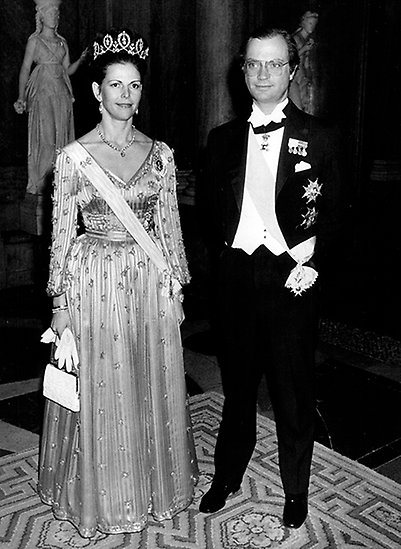
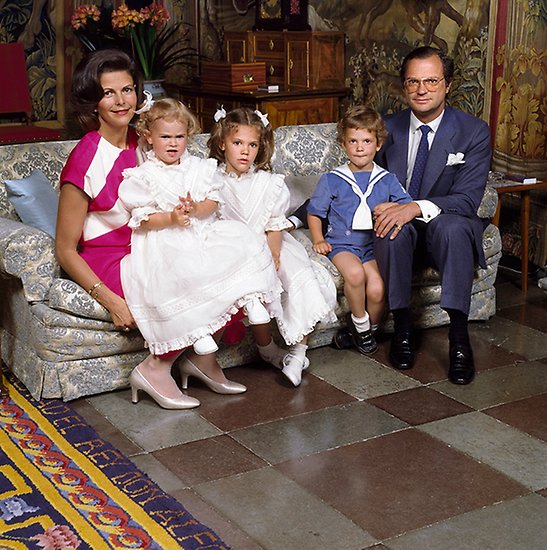
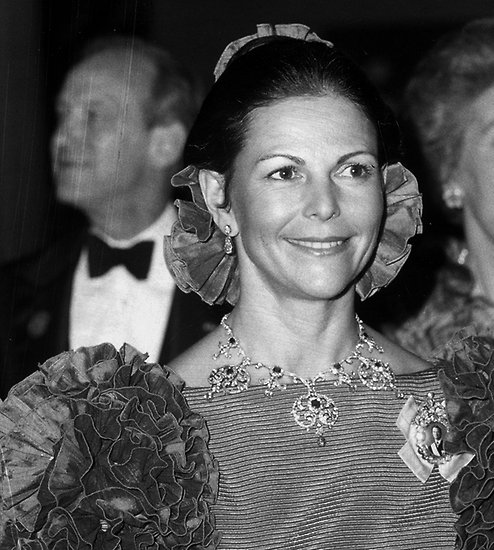
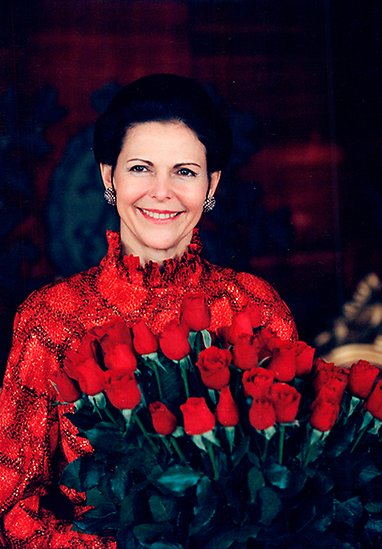
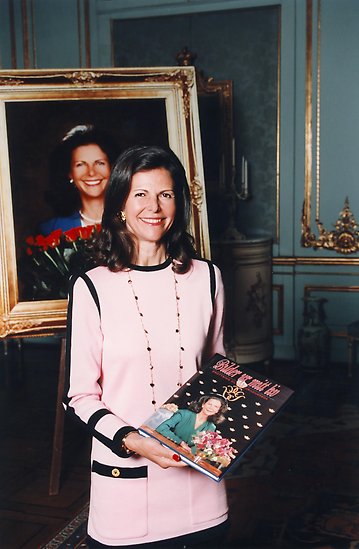
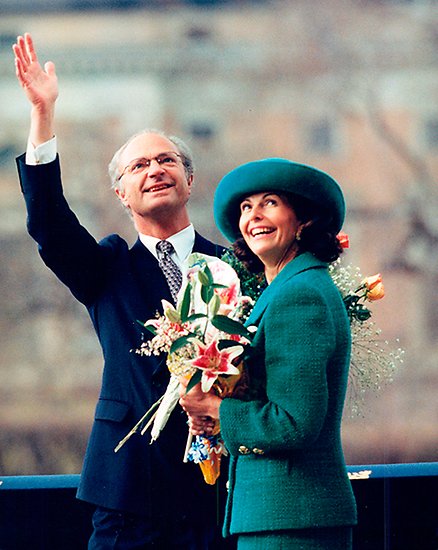
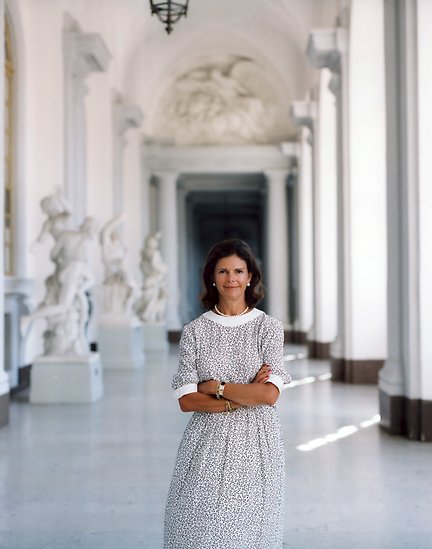
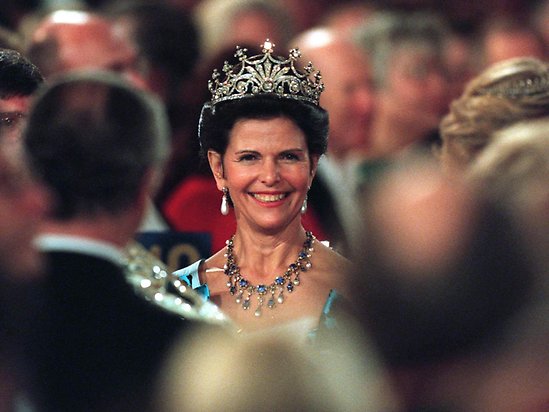
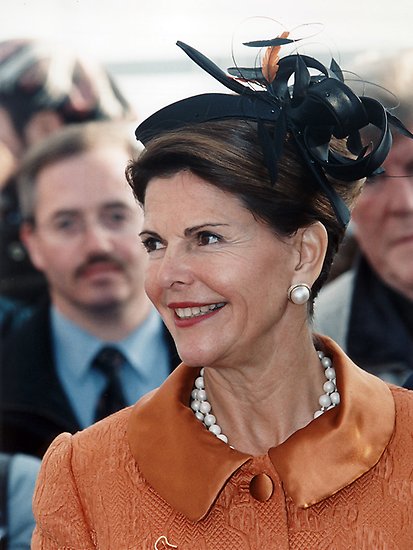
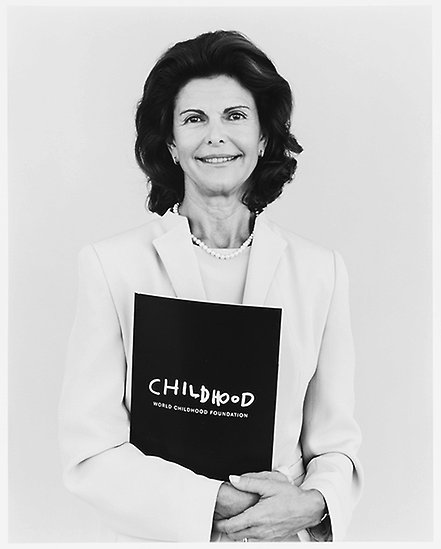
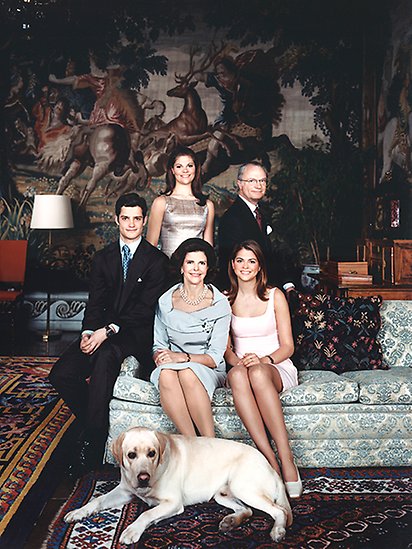
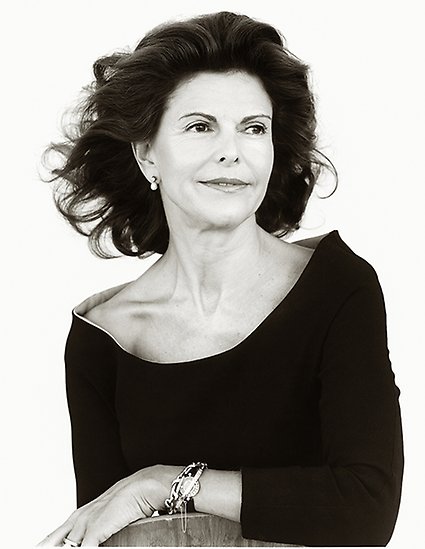
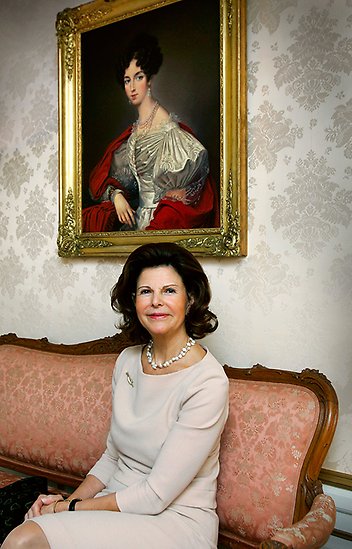
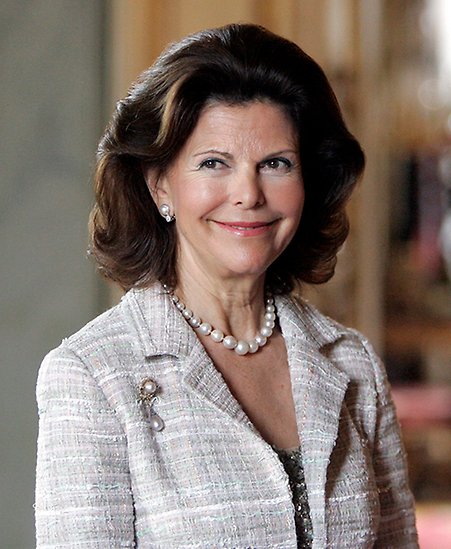
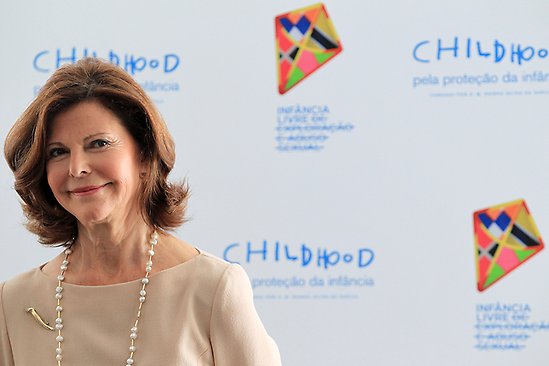
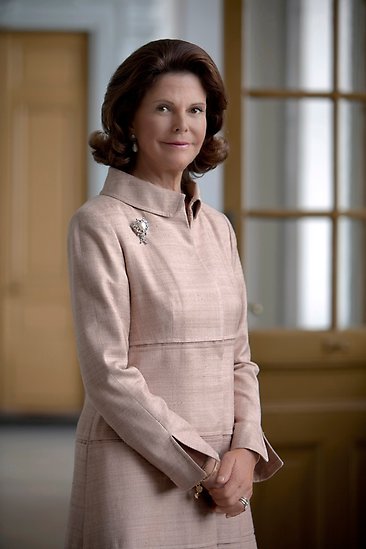
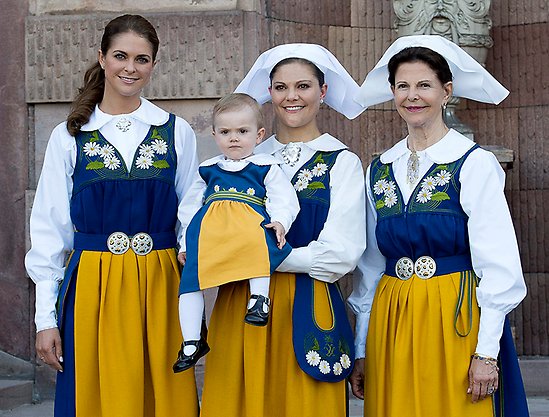
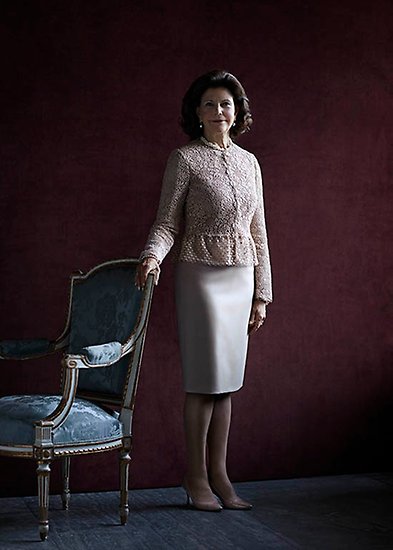
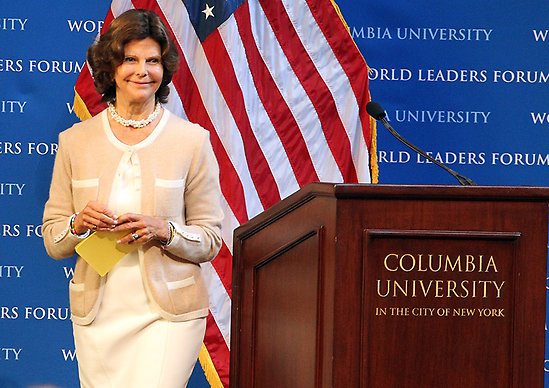
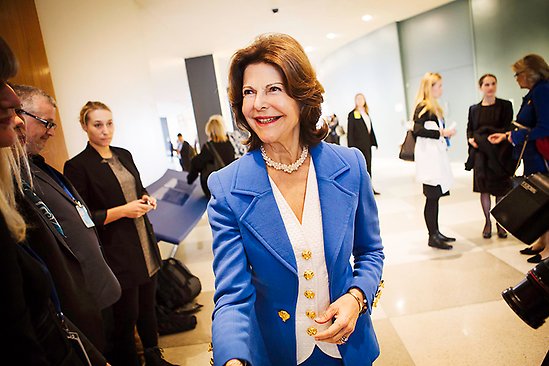
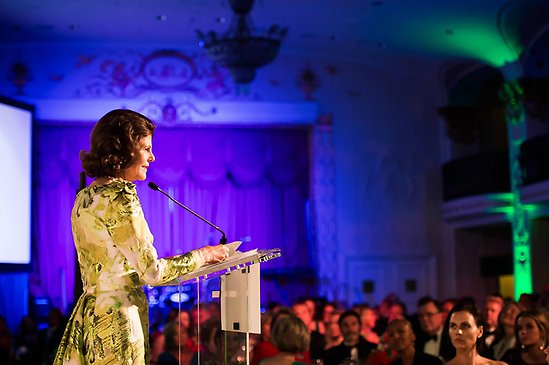
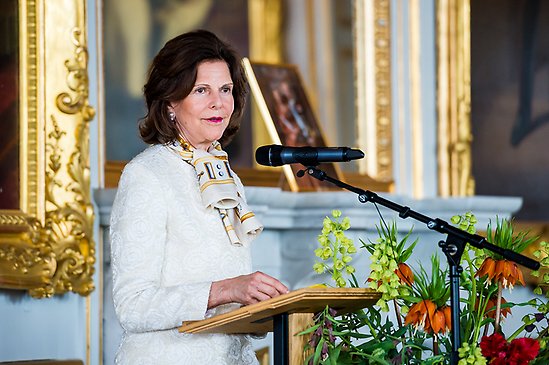
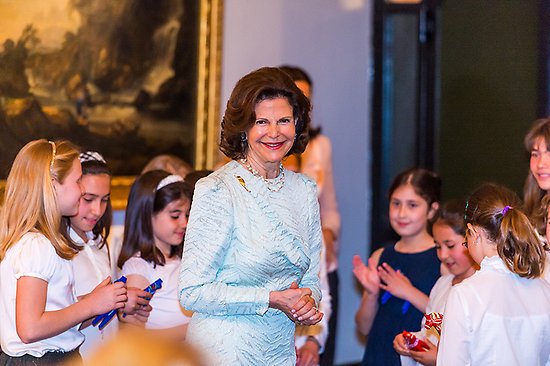
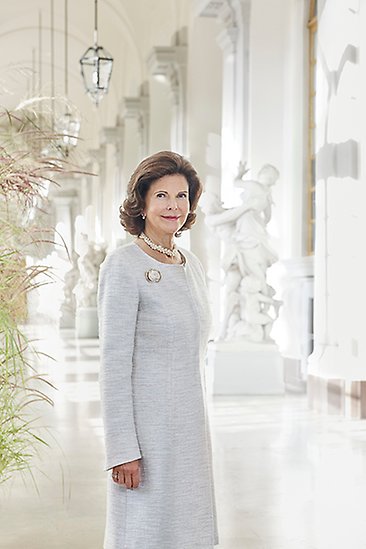
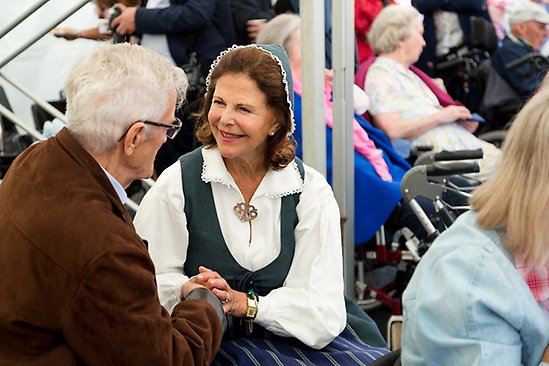
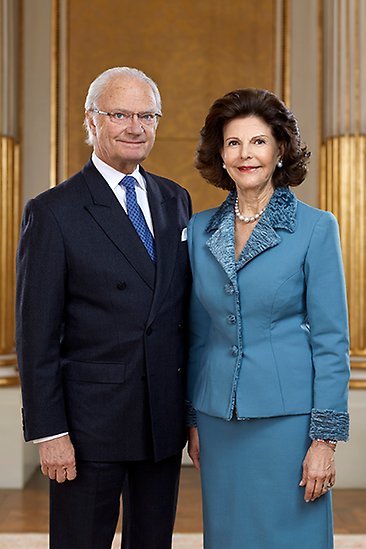
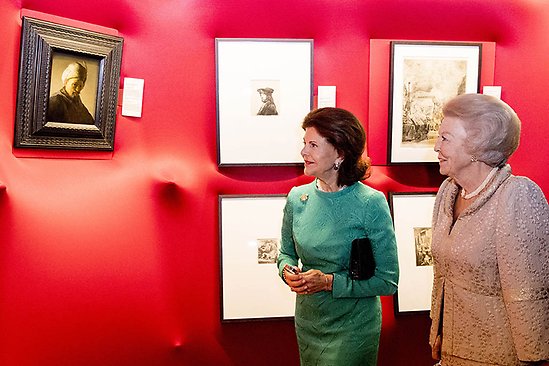
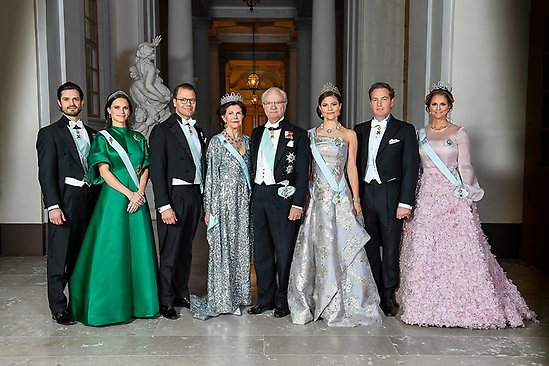
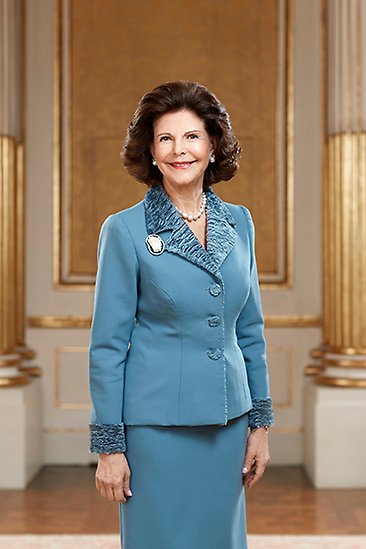
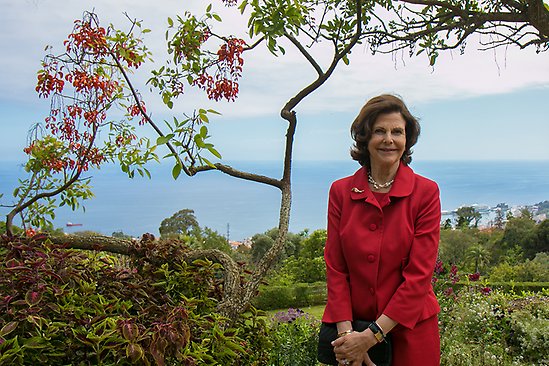
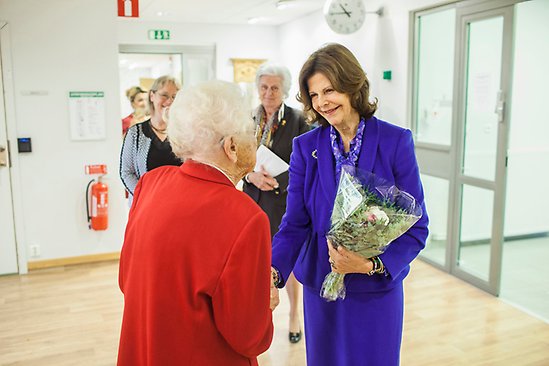
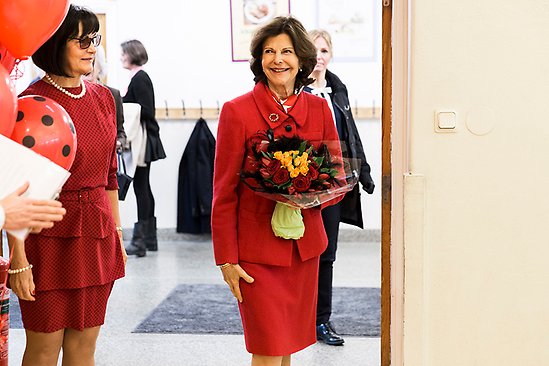
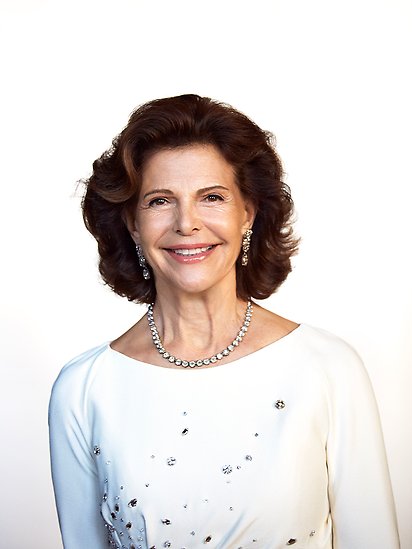
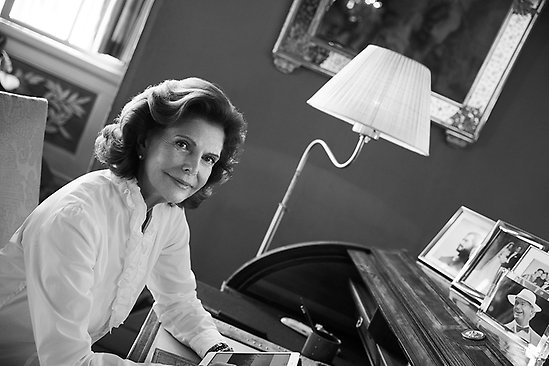
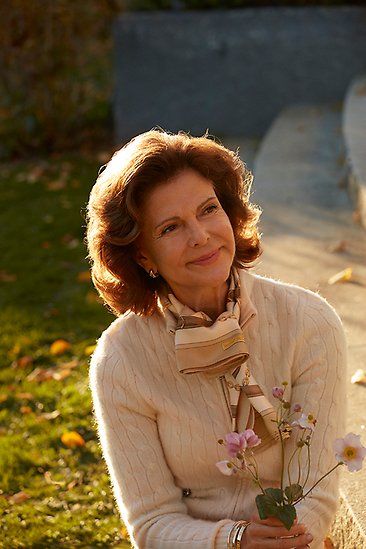
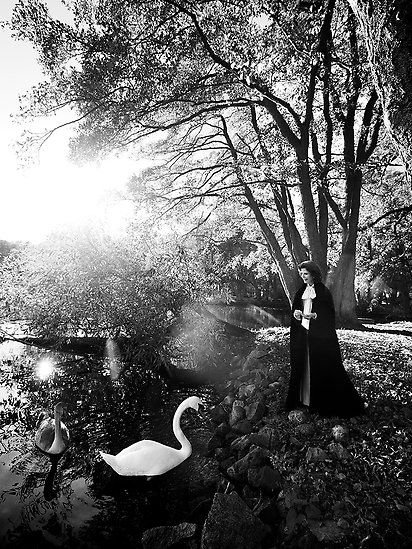
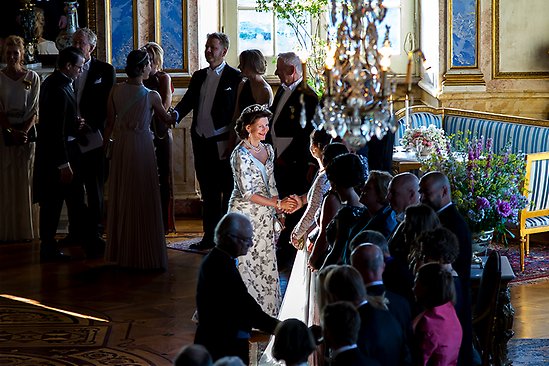
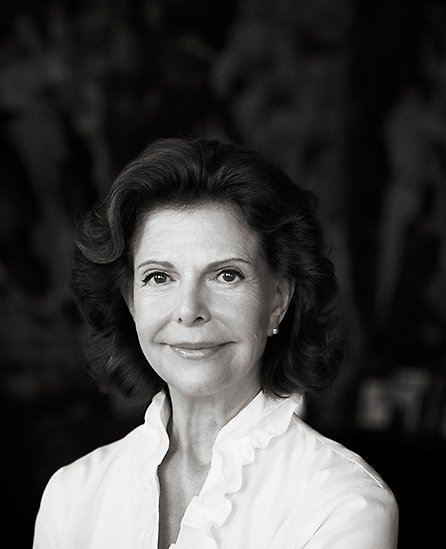
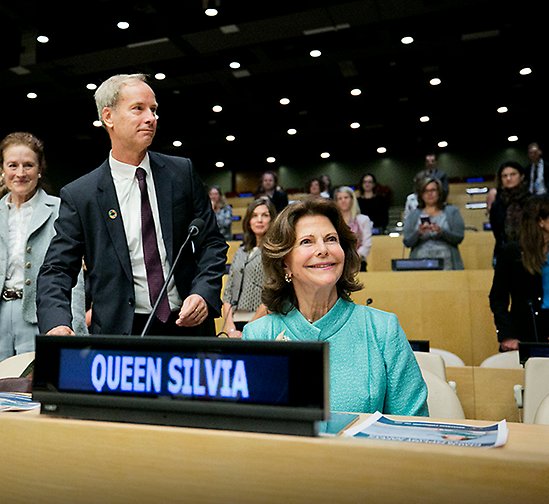
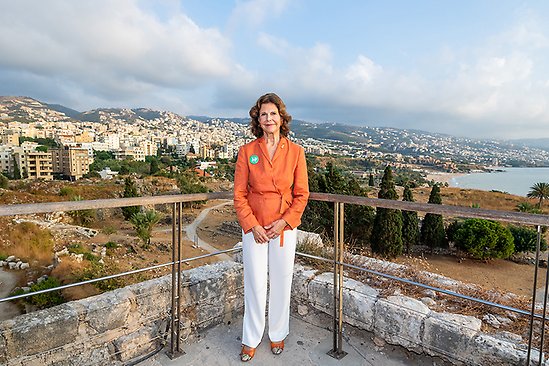
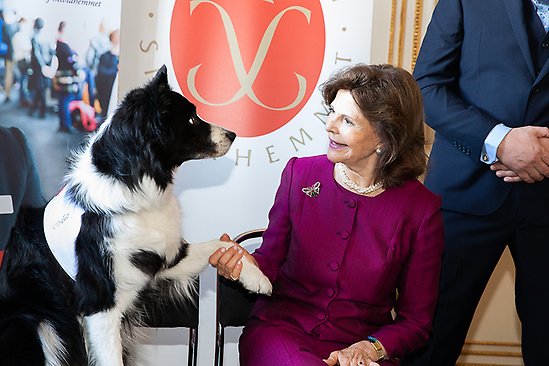
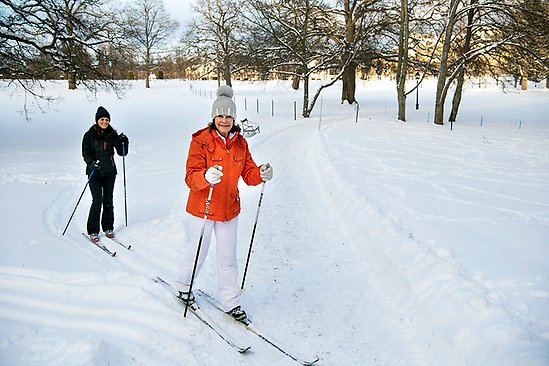
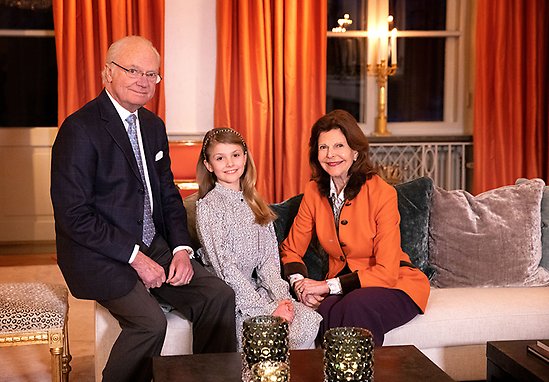
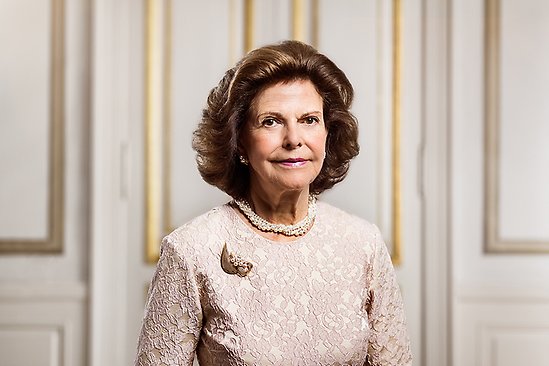
Symbols
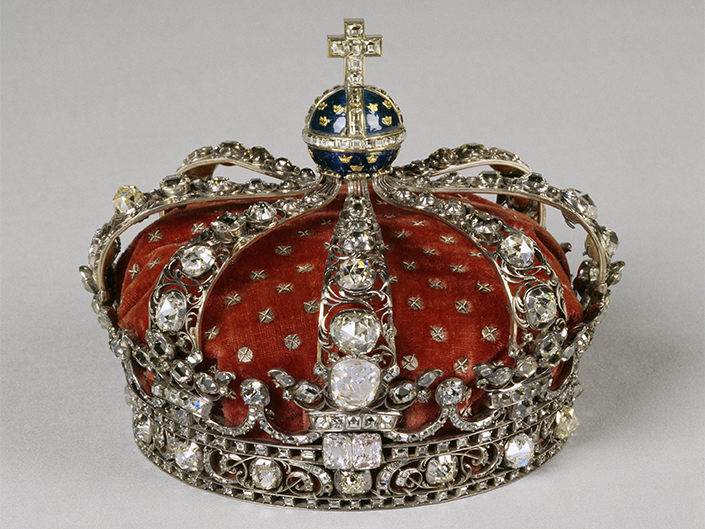
The Queen's crown
Lovisa Ulrika's crown from 1751 is the crown of the Queen of Sweden.

The Queen's seraphim shield
HM The Queen's seraphim shield, made by coat of arms painter David Friefeldt.
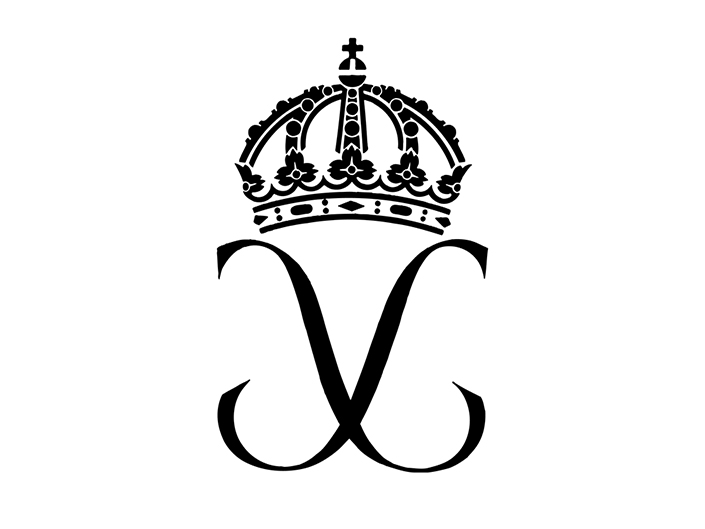
The Queen's monogram
The Queen's monogram and The King and Queen's joint monogram.
The Queen's recent speeches
-
HM The Queen's speech at SOS barnbyars head office
14 March 2024Thank you for the warm welcome! It is wonderful to be here. Over the years I have had the privilege of visiting Childre...
Speeches -
HM The Queen's speech at the symposium Challenges for implementation of new Alzheimer Disease treatments
18 January 2024It is a pleasure to be here today at this symposium supported by the “Foundation for Gamla Tjänarinnor (Old Servants)” a...
Speeches -
HM The Queen's speech at the EAACI PhARF Award
6 December 2023It is my pleasure to be back here after 20 years and it is also a great pleasure to be invited to this very special occa...
Speeches
Orders
HM The Queen's orders
List of HM The Queen's foreign order holdings.
Argentine Republic
- The Order of the Liberator General San Martin, Grand Cross
Republic of Austria
- The Decoration of Honor for Services to the Republic of Austria, Grand Star
- Austrian Olympic Medal 1976
Kingdom of Belgium
- The Order of Leopold, Grand Cross
Federal Republic of Brazil
- The Order of the Southern Cross, Grand Cross
Brunei Darussalam
- The Most Esteemed Family Order of Laila Utama, Grand Cross with Collar
Republic of Bulgaria
- The Order of Stara Planina, Grand Cross
- The Order of the Rose, 1st Class
Republic of Chile
- The Order of Merit, Grand Cross
Republic of Croatia
- The Grand Order of Queen Jelena with Sash and Morning Star
Kingdom of Denmark
- The Order of the Elephant, Knight
Arab Republic of Egypt
- The Order of Al-Kemal, Supreme Class
Republic of Estonia
- The Order of the White Star, 1st Class
- The Order of the Cross of Terra Mariana, 1st Class
Republic of Finland
- The Order of the White Rose, Grand Cross with Collar
Republic of France
- The Order of the Legion of Honor, Grand Cross
- The Order of National Merit, Grand Cross
Federal Republic of Germany
- The Order of Merit of the Federal Republic of Germany, Grand Cross, Special Class
Republic of Greece
- The Order of Honor, Grand Cross
Republic of Hungary
- The Order of Merit, Grand Cross
Republic of Iceland
- The Order of the Falcon, Grand Cross
Republic of Italy
- The Order of Merit of the Italian Republic, Grand Cross
Japan
- The The Imperial Order of the Crown, Grand Cordon
The Hashemite Kingdom of Jordan
- The Order of Al-Nahda, Grand Cordon
Republic of Korea
- The Order of Diplomatic Service Merit, 1st Class
Republic of Latvia
- The Order of the Three Stars, Grand Cross
Republic of Lithuania
- The Order of Vytautas the Great with the Golden Chain
Grand Duchy of Luxembourg
- The Order of the Gold Lion of the House of Nassau, Knight
Malaysia
- The Most Exalted Order of the Crown of the Realm, Grand Cross and Collar
United Mexican States
- The Order of the Aztec Eagle, Grand Cross
Kingdom of the Netherlands
- The Order of the Netherlands Lion, Knight Grand Cross
- The Order of the House of Orange, Grand Cross
Kingdom of Norway
- The Royal Norwegian Order of St Olav, Grand Cross
Republic of Poland
- The Order of the White Eagle, Knight
Republic of Portugal
- The Military Order of Christ, Grand Cross
Romania
- The Order of the Star of Romania, Grand Cross
- The Order of 23 of August, (awarded by the former Peoples Republic of Romania)
Republic of Slovenia
- The Order for Exceptional Merits
Kingdom of Spain
- The Royal and Distinguished Order of Charles III, Grand Cross
- The Order of Isabella the Catholic, Grand Cross
Kingdom of Thailand
- The Order of Chula Chom Klao, 1st Class
Republic of Tunisia
- The Order of Merit, Grand Cross
Ukraine
- The Order of Merit, 1st Class
- The Order of Jaroslav the Vise, Commander 1st Class
The Vatican State
- The Order of Pius XII, Grand Cross
- The Cross Pro Ecclesia et Pontifice
Honorary doctorates, prizes and awards
HM The Queen's honorary doctorates, prizes and awards
Here is a list of the honorary doctorates, prizes and awards that The Queen has received.
- Honorary doctorates
- 1990 – Turku University
- 1993 – Karolinska Institutet
- 1994 – Linköping University
- 1999 – University of Gothenburg
- 2023 – University of Stirling
Prizes and awards
Over the years, The Queen has received a number of awards in recognition of her personal commitment to social and humanitarian issues, particularly in relation to children's and young people's rights.
- 1989 – German Culture Prize, Munich, Germany
- 2001 – Alzheimer Europe Award, Brussels, Belgium
- 2001 – SWEA International's Swedish Woman of the Year Award, Gothenburg, Sweden
- 2002 – German Media Award, Baden-Baden, Germany
- 2005 – Dr Jushichiro Naito International Childcare Award, Stockholm, Sweden
- 2006 – Bambi Prize (Ehrenbambi), Stuttgart, Germany
- 2007 – Order of Merit of Baden-Württemberg, Schwetzingen Palace, Baden-Württemberg, Germany
- 2007 – BRIS Award, Royal Palace, Stockholm, Sweden
- 2007 – Quadriga Award, Berlin, Germany
- 2009 – Courage Prize, Bad Iburg, Germany
- 2010 – St Erik Medal , Stockholm City Hall, Sweden
- 2011 – Health and Human Rights Leadership Award, New York, USA
- 2011 – Solstickan Prize, Stockholm, Sweden
- 2012 – Stenbeck Prize
- 2012 – Steiger Charity Award
- 2014 – Der Friedenstein Cultural Prize
- 2014 – Martin Buber Award
- 2014 – A Heart for Children
- 2015 – European Humanitate Prize
- 2015 – Honorary Award of the National German Sustainability Award
- 2016 – Benedikt Prize
- 2016 – Bayerischer Stiftungspreis
- 2017 – Humano – Botschafter der Menschlichkeit
- 2017 – Theodor Wanner Prize
- 2019 – Karl Kübel Prize
- 2020 – Butterfly Prize, Women's Organisations Committee on Alcohol and Drug Issues
- 2023 – Honorary citizenship, Heidelberg, Germany


